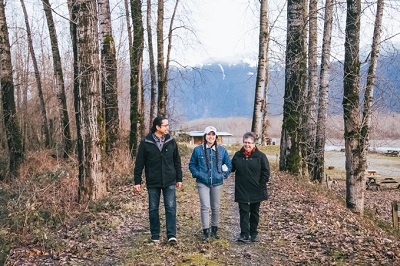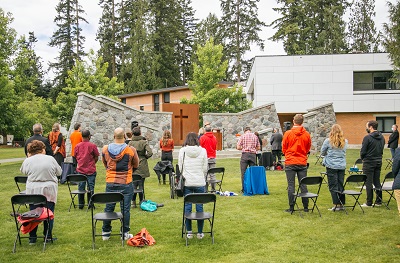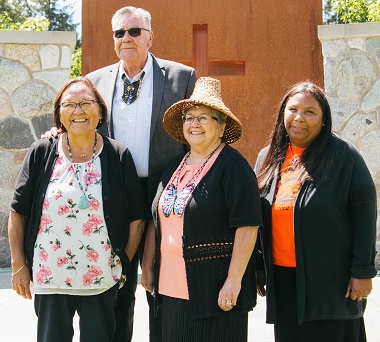Patricia Victor (centre) with Rev. Bruce Brown and wife Adeline Brown from Haida Gwaii and TWU alumna Kathleen Lounsbury. Photo: Summer Jackson
“[We] tell our own stories of the significant places . . . so that we have not just a Trinity Western history, but also the Indigenous history of the land where we’re located.”
– Patricia Victor, University Siya:m
Patricia Victor, University Siya:m, leads faculty researchers to better understand the Stó:lō land and context where Trinity Western University was founded in 1962.
“We’re taking a look at listening to the stories of the Stó:lō people,” Victor said.
Victor is Stó:lō from Cheam First Nation. She is also the pastor of a First Nations church in Chilliwack and an ordained minister with the Pentecostal Assemblies of Canada.
“Stó:lō means river,” she explained, “We are walking beside the Fraser River, hearing stories and history. [We are] looking at the current context, and at what we’re doing today that is having an impact on Stó:lō people.”
By walking the lands together, Victor helps the TWU community to “look at Stó:lō as part of their sustenance.”
Knowing before doing
“My role and my passion is just to walk with people where they’re at, and build those good relationships,” she said, encapsulating her work.
In fact, when Victor leads meetings, she does it in a surprisingly different way. “It is not agenda driven; it’s relationship driven,” she said.
“When we gather, we gather to know each other. And then you can do the business of the day.”
Victor notes that this matches Jesus’ way of relating. “He’s interested in having relationship with us, and out of relationship, we do the work that he sets before us. That’s how we need to relate to one another as people,” she said.
Victor sees this relational foundation of work as valuable for the university. “My belief is that that is how we should be doing the work in the university as well. It’s God-honouring,” she said.
“It provides respect and dignity to everyone that is in your space, and for that moment. That honours God.”
Indigenous Partnership Council
Victor’s journey at TWU began when she was a graduate student, pursuing a Master of Arts in Leadership with a focus on Christian ministry.
While pursuing graduate studies at TWU, Victor was invited to join a TWU task force whose purpose was to build good relationships with the Indigenous community.
Together with the task force, Victor worked alongside TWU faculty, staff and students to help the university to better serve Indigenous students, and to bring in supportive resources for them. This task force eventually became TWU’s Indigenous Partnership Council, and their work continues today.
Wisdom and integrity
When Victor graduated in 2012, she was invited to become TWU’s first-ever University Siya:m. In the language of the Stó:lō people, Siya:m describes a leader recognized for wisdom and integrity, who willingly shares knowledge with others.
Victor describes how her role as Siya:m has three main areas of focus.
The first is to raise awareness of Indigenous perspectives among the TWU community. She reviews how the university’s policies could better honour Indigenous peoples. She helps create learning opportunities for the community to engage with Indigenous culture and Indigenous ways of knowing and being.
Walking alongside
 Victor’s second area of focus is caring for students. For students, she fosters culturally-appreciative ways of being together and of mutual encouragement.
Victor’s second area of focus is caring for students. For students, she fosters culturally-appreciative ways of being together and of mutual encouragement.
“Equally important is that our Aboriginal students are fully supported, not just academically, and not just spiritually . . . not [even] just physically, but also culturally,” she said.
She describes what it looks like to walk alongside students. “Sometimes it’s just being a listening ear. Sometimes it’s praying with a student.”
“Sometimes it’s walking with them in their circumstances, not just academically, but for things that are happening within their own lives, within their own community,” she said.
“[It’s about] being that support person while they’re away from home.”
Part of student care is also providing educational opportunities for non-Indigenous students who are interested to learn more about Indigenous perspectives, and Indigenous ways of knowing and being. Victor creates spaces to bring people together, “so that we continue living and growing and developing relationship.”
Nursing and teaching practicums
The third component of Victor’s work is building relationships beyond TWU’s campuses. Her work is to foster connections with TWU and Aboriginal communities and to build educational partnerships.
The School of Nursing, for example, has provided opportunities for students to fulfill their practicums within Stó:lō Indigenous communities. The School of Education has partnerships with Indigenous schools and places students within Indigenous classrooms for teaching practicums.
“We’ve had good opportunity there,” said Victor about the nursing and education partnerships.
Research / Cheam First Nation
Victor also leads several TWU research projects that foster Indigenous perspectives. Through these projects, she is helping TWU faculty to better understand and appreciate Indigenous history and environment.
One project focuses on leading research teams to visit Cheam First Nation and walk the Stó:lō lands. “I wanted them to walk (the land) themselves and get a feel for it, its history. That’s all part of building relationships within our own community,” Victor said.
She works with BC Fraser River fishing authorities, scientists and biologists, as well as Indigenous chiefs and councils who oversee the territories that they walk through.
Walking with Kwantlen leaders
Another significant place of Indigenous history is TWU’s Langley campus. Victor has a vision to have local Kwantlen leaders to lead walking tours of TWU’s Langley campus.
“[We] tell our own stories of the significant places . . . so that we have not just a Trinity Western history, but also the Indigenous history of the land where we’re located,” she said. “Kwantlen people have their own stories, their own significant places that we need to recognize. TWU history does not start with the dairy farm.”
Victor is part of the TWU Campus Place Name research project, which will lead to honouring the Indigenous history of the land where TWU is located.
Learning together

University Siya:m Patricia Victor leads the TWU community in prayer and remembrance during a vigil June 10. Photo: Summer Jackson
Over the years, Victor has helped the TWU community in many ways. She has led vigils for murdered and missing Indigenous women. These gatherings encouraged students to be educated about needs in our society, to pray and to reflect. She has challenged students to consider “how to personally take a look at making those changes in our own attitude and heart.”
She has further provided opportunities for students to experience Indigenous gatherings on campus and to see past the stereotypes about Indigenous ceremonies.
“People came and experienced the tearing down of old barriers because of colonization and fear and ignorance,” she said.
Beyond her work at TWU, Victor often speaks to Christian schools about Indigenous perspectives, and she is regularly invited to be a speaker at various conferences.
All of these efforts are ways in which Victor and others are helping build relationships and partnerships with Indigenous communities.
Victor sees these partnerships as key to moving forward. “So it’s not just ‘us and them’ but that solid relationship,” she said.
This article was first posted on the Trinity Western University site and is re-posted by permission.
Winnie Lui is director of public relations for TWU.

